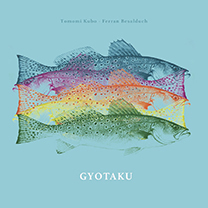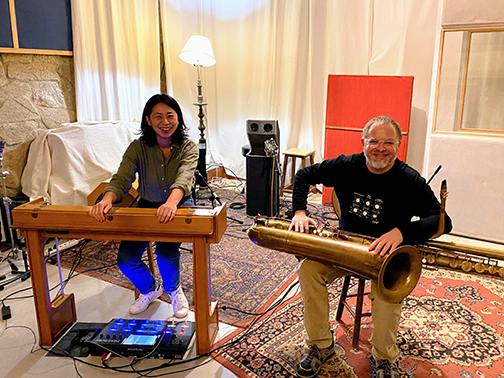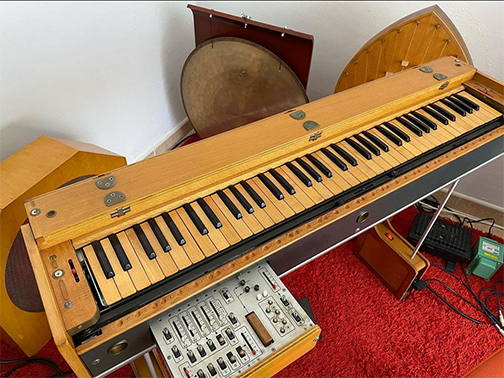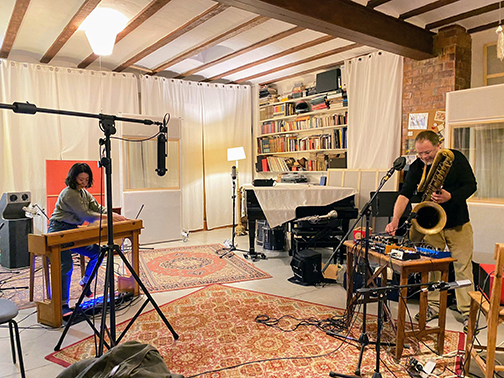|
|
|
|
Music Reviews from the Staff of the Poison Pie Publishing House
|
|
August 30, 2022
Gyotaku - Tomomi Kubo & Ferrán Besalduch
 Label: Call it Anything Records: social media & Bandcamp
Label: Call it Anything Records: social media & Bandcamp
Catalog #: CIA-11
Location: Badalona, Spain
Release Date: June 15, 2022
Media: cd or digital download
bandcamp.com entry
discogs.com entry
We begin this review with the redundant message that what words we expend in the description of Gyotaku neither increase nor decrease its intrinsic value. The staff of the Poison Pie Publishing House acknowledge that their reviews are utterly superfluous. With that disclaimer behind us, we can now proceed to the matter at hand. Usually when we are faced with the prospect of writing a review, either because someone prodded us to do so or the music moved us in that direction on its own, we are confronted by the unavoidable fact that we have nothing essential to say about the music. Still, we sit and listen and somewhere in the middle of things, we begin to write.
The mechanism by which this inspiration occurs is no mystery. The American trombonist and scholar, George Lewis, articulated it more than fifteen years ago, when he wrote, "I feel that when people are listening to music, they can do it because of the sense of empathy that allows them to respond to the creativity of
other people by feeling their own creativity. In other words, those neurons start firing and those experiences, those bodily feelings, start to resonate with the creativity that's coming from outside, because they've got it within them." [Interview with Lloyd Peterson, from "Music and the Creative Spirit: Innovators in Jazz, Improvisation and the Avant Garde", Scarecrow Press, Lanham, MD, 2006.]
What's surprising about Gyotaku is how quickly into the album, we already had something to say and how much we wanted to convey. Here we capture a few of those thoughts. Everything fell into place on this record. We love listening to musicians who are new to our ears for the first time. On Gyotaku, we were previously familiar with neither Tomomi Kubo nor Ferrán Besalduch. Each musician has their own active history (see the musican links below) but the world is a big place and the strains of their music hadn't found our ears yet. Happily, that omission is now corrected.

Tomomi Kubo and Ferrán Besalduch during the recording session for Gyotaku.
Second, we love eclectic instruments. Some examples that instantly spring to mind are the daxophone as played by Hans Reichel and Kazuhisa Uchihashi , the waterphone as played by, for example, William Parker, the long-string instrument of Ellen Fullman or the polygonola of Keiji Haino. So, suffice to say, we are not completely ignorant of unusual instruments. In fact, on the first day of the fall semester, we brought a home-built theremin to our class, The Golden Age of Non-Idiomatic Improvisation, taught at the University of Tennessee. Still, we don't remember being familiar with the Ondes Martenot, the instrument on which Ms. Tomomi Kubo performs on Gyotaku. To learn about the instrument as we listened to its electronic tones was an unexpected delight.

The Ondes Martenot of Tomomi Kubo. Photo Credit: Tomomi Kubo.
Third, we have come to love jazz—jazz with melody as well as jazz in which the musicians adopt innovative approaches to interacting with the instrument. Mr. Ferrán Besalduch introduces himself here with a performance that spans both ends of this spectrum. The collaboration with the Ms. Kubo on Ondes Martenot is very sympathetic. Each operates at various points along an axis from melody to dissonance and they use this contrast, fluidly varying the subject matter in response to one another, to great effect. This is not just electronic music nor is this just jazz, nor electronic jazz; this music is greater than the sum of its parts.

Tomomi Kubo and Ferrán Besalduch during the recording session for Gyotaku.
Fourth, we are asked to interpret this music through the lens of gyotaku, the traditional Japanese method of printing fish. As if the innovation in the music wasn't enough, the association with this other art form is icing on the cake. We have not plumbed the depths of the relationship between the music and printing fish but this mystery gives us something to ponder during future listenings.
Finally, we have long been a dedicated listener of non-idiomatic improvisation and this album has found a unique place within the vast repertoire of such music. As we listened we just couldn't believe our good fortune at stumbling upon such wonderful music. We began to feel a little bit of karmic embarrassment. Our behavior just hasn't been that exemplary lately. An encounter with this music was much better than we deserved. We shall have to improve our actions going forward to make up the deficit! When John Coltrane said, "I want to be a force for real good," this is what he meant—music that prompts people to be better. It's not an exaggeration to say that Gyotaku follows in these steps.
personnel:
|
|
|
Related Reviews from the Poison Pie Publishing House
- Music with Unusual Instruments
More music reviews from the Poison Pie Publishing House
|
|
|
|

